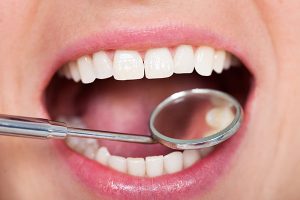How to Prevent Gum Disease in Luck, WI
Protect Your Smile’s Foundation with Periodontist Preventive Tips

Gum disease can lead to serious health problems if left untreated, including tooth loss, bone loss, and even heart disease. Our Luck, WI, dentist, Dr. Morgan Clemenson, can ensure your oral health is in excellent condition. Contact Luck Dental Clinic at (715) 472-2211 to learn more.
What is Gum Disease?
Gum disease, also known as periodontal disease, is an infection that attacks the tissues surrounding and supporting your teeth. It’s a prevalent condition caused by plaque buildup, a sticky film teeming with bacteria that forms on teeth. If not removed through regular brushing and flossing, plaque hardens into tartar (calculus). This hard buildup further irritates the gums, creating a cycle of inflammation and infection.
Stages of Gum Disease
Gum disease progresses through stages, with gingivitis being the earliest and most treatable. Symptoms of gingivitis may include:
- Red, inflamed gums
- Gums that bleed easily, especially during brushing or flossing
- Slight gum tenderness

- Receding gums
- Increased gum sensitivity
- Deep pockets forming between the teeth and gums
- Loose teeth
- Persistent bad breath (halitosis)
- Possible pus discharge from around the teeth
What Causes Gum Disease?
Several factors contribute to the development of gum disease. Here are some of the most common culprits:
- Poor Oral Hygiene: Brushing twice daily with fluoride toothpaste and flossing are essential to remove plaque and bacteria. Skipping these practices allows plaque to accumulate and irritate the gums.
- Tobacco Use: Smoking and chewing tobacco significantly weaken the immune system, making it harder for your body to fight off gum disease-causing bacteria.
- Genetics: Some individuals are genetically predisposed to gum disease, making them more susceptible despite good oral hygiene practices.
- Hormonal Changes: Fluctuations in hormone levels during pregnancy, puberty, and menopause can heighten gum sensitivity and make them more prone to inflammation.
- Certain Medications: Medications that dry out the mouth can create an environment where bacteria thrive, increasing the risk of gum disease.
- Underlying Health Conditions: Certain medical conditions like diabetes and HIV/AIDS can compromise the immune system and elevate the risk of gum disease.
Ways to Prevent Gum Disease
Meticulous Oral Hygiene

Maintain a Healthy Diet
Limit sugary foods and drinks that nourish plaque bacteria. These sugary substances create an acidic environment in your mouth that promotes the growth of harmful bacteria. Focus on consuming a balanced diet of fruits, vegetables, and whole grains. These foods provide essential vitamins and minerals that contribute to oral health, including strong gums.
Quit Smoking
Smoking is a major risk factor for gum disease. Smoking weakens the immune system and reduces blood flow to the gums, making them more susceptible to infection. Quitting smoking significantly improves your health and reduces your risk of developing gum disease.
Schedule Regular Dental Checkups and Cleanings:
Professional dental cleanings, typically recommended every six months, remove plaque and tartar buildup that brushing and flossing alone cannot eliminate. During regular dental checkups, your dentist can assess your oral health for signs of gum disease and provide early intervention if necessary. Early detection and treatment of gum disease are crucial to prevent its progression and potential tooth loss.
Manage Stress
Chronic stress weakens the immune system, making you more susceptible to infection, including gum disease. Find healthy ways to manage stress, such as exercise, relaxation techniques like meditation or yoga, or spending time in nature. Reducing stress can significantly improve your overall health and well-being, including oral health.
What Should I Do if I Suspect I Have Gum Disease?
Schedule an appointment with your Luck, WI, dentist as soon as possible. Early detection and intervention are essential for effectively treating gum disease and preventing complications.
During your appointment, Dr. Clemenson will conduct a thorough examination of your mouth, including X-rays if necessary, to diagnose the severity of your gum disease. They will then develop a personalized treatment plan to address your specific needs. Treatment for gum disease may involve professional cleanings, scaling, root planing (deep cleaning), antibiotics, or even surgery in advanced cases.
Frequently Asked Questions
Brushing too hard can contribute to gum disease. Brushing with excessive force can irritate and damage gum tissue, making it recede and exposing the tooth root. This exposed root surface is more susceptible to plaque buildup and infection, which can worsen gum disease.
There are no definitive home remedies for gum disease. While some practices may provide temporary relief from symptoms like inflammation, they won’t address the underlying cause. If you suspect gum disease, visit a dentist for proper diagnosis and treatment.
Mouthwash can be a helpful adjunct to brushing and flossing, but it’s not a replacement. Mouthwash can help reduce plaque and bacteria levels, especially in areas where brushing and flossing might not reach as effectively.
Don’t Let Gum Disease Take a Bite Out of Your Health
Looking for a dentist in Luck, WI who specializes in gum disease treatment and prevention? Our dental practice is committed to providing patients with the personalized care they need to achieve optimal oral health.
Our team of experienced professionals can help you prevent gum disease, manage existing gum disease, and restore your smile to health. Schedule your appointment at (715) 472-2211 and take the first step toward achieving optimal oral health. We welcome patients from Frederic, Balsam Lake, and St. Croix Falls, WI.
